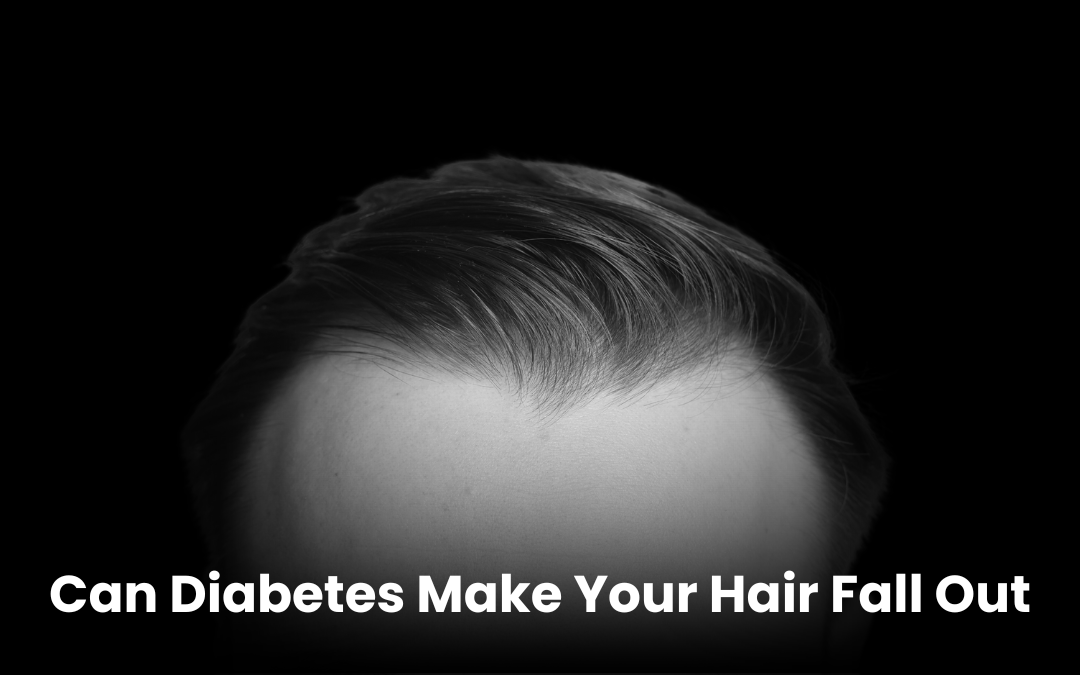If you have noticed thinning hair or excessive shedding while managing diabetes, you might wonder: Can diabetes make your hair fall out? The answer, surprisingly, is yes.
Diabetes, a condition that affects millions worldwide, impacts more than just blood sugar levels. One of its lesser-known side effects is hair loss, a distressing issue for many. Elevated blood sugar levels can disrupt the body’s natural hair growth cycle, leading to thinning and loss over time.

But don’t worry – understanding why this happens is the first step toward addressing it. At QHT Clinic, one of the best hair transplant clinic in India, we specialize in restoring hair health, even when conditions like diabetes seem to work against it.
Will diabetes make your hair fall out? Let’s explore how it impacts your hair.
Is hair loss a symptom of diabetes?
Hair loss can be a symptom of both type 1 and type 2 diabetes. In type 1, the immune system attacks the insulin-producing cells in the pancreas, leaving the body without insulin. On the other hand, type 2 diabetes occurs when the body struggles to use insulin properly, leading to insulin resistance.
Insulin is vital for converting blood sugar into energy. When insulin isn’t working effectively, blood sugar levels remain elevated, causing damage to various systems in the body.

Over time, this can affect circulation and the health of hair follicles, leading to hair loss. Proper diabetes management is essential to reduce this and other complications, helping preserve hair health.
Concerned about how diabetes is affecting your hair? Consult a hair specialist to explore personalized solutions and regain your hair’s health and vitality.
Does diabetes make your hair fall out? Learn how this common condition impacts your hair.
How does diabetes affect hair growth?
Diabetes affects hair growth through various mechanisms, each tied to the broader impacts of the condition on the body.
Immune system disorders
For those with type 1 diabetes, the risk of developing other autoimmune diseases is higher. One such condition is alopecia areata, where the immune system erroneously attacks hair follicles, causing patchy hair loss on the scalp and other areas.

Hyperglycemia
Persistent high blood sugar levels, or hyperglycemia, result when the body cannot properly utilize glucose. This can be due to insufficient insulin production or insulin resistance. Over time, high glucose levels can damage small and large blood vessels. This reduced blood flow can impair hair follicles’ ability to receive nutrients and oxygen, disrupting hair growth. This often leads to thinning hair, increased breakage, and slower growth rates. Insulin resistance also contributes to microvascular damage, which can aggravate conditions like androgenic alopecia.
Hormonal imbalance
Diabetes often affects thyroid function, which is crucial for maintaining a healthy hair growth cycle. Additionally, elevated levels of cortisol, a stress hormone that is commonly high in diabetes, can negatively impact hair follicles. This disruption can lead to hair loss, including generalized thinning and increased shedding.
Medications
Certain medications used to manage diabetes, such as insulin or oral hypoglycemic agents, can have side effects that impact hair health. Sometimes, these medications may cause hormonal changes or affect nutrient absorption, indirectly contributing to hair thinning or increased shedding. Additionally, medications used to treat diabetes-related complications, like blood pressure or cholesterol-lowering drugs, may also play a role in hair loss.
Don’t let hair loss hold you back. Schedule a consultation today and discover the most effective solutions to restore your hair and confidence.
Find out how to take control and restore your hair with effective management strategies and treatments.
How can you manage hair loss with diabetes?
Managing hair loss while living with diabetes involves addressing both the condition itself and the factors affecting your hair health:
- Control blood sugar levels: Keeping your blood sugar levels in check is crucial. Proper management through diet, exercise, and medication can improve overall health and reduce the impact of diabetes on your hair growth cycle.

- Manage stress: Chronic stress from managing diabetes can contribute to hair loss. Incorporating stress-relieving activities such as meditation, yoga, or exercise can help reduce cortisol levels and protect your hair follicles.
- Ensure proper nutrition: A well-balanced diet rich in vitamins and minerals, such as zinc, biotin, and vitamins D and E, supports healthy hair growth. Consult with your doctor or nutritionist to ensure you are getting the nutrients you need.
- Review medications: If you suspect your medications might be contributing to hair loss, talk to your healthcare provider. They may be able to adjust your dosage or suggest alternatives that have less impact on hair health.
- Practice gentle hair care: Steer clear of harsh chemicals, heat treatments, and excessive styling, as these can further damage your hair. Choose gentle, sulfate-free shampoos and conditioners to help nourish and protect your hair.
- Consult a hair specialist: Seeking advice from a hair specialist can provide you with targeted treatments, such as topical solutions, supplements, or procedures like hair transplants, that can address your specific hair loss concerns.
Solutions to managing diabetes-related hair loss
Managing diabetes-related hair loss can involve a combination of medical treatments and advanced hair restoration techniques:
- Medications: Topical solutions like minoxidil can stimulate hair growth and are commonly recommended for individuals experiencing thinning hair. Hormonal treatments may also be prescribed if imbalances are contributing to hair loss.

- Follicular unit extraction: FUE is a widely used, minimally invasive hair restoration method where individual hair follicles are carefully extracted from donor sites and transplanted to areas with thinning or no hair. This method minimizes scarring and provides natural-looking results.
- QHT (Quick Hair Transplant): QHT is an advanced version of FUE, where hair grafts are extracted using superfine Cole punches, minimizing the risk of scarring. The implantation process is done with SAVA implanters, allowing for more precise placement of grafts and ensuring better hair density and a natural look.
- PRP (Platelet-Rich Plasma): PRP therapy uses injections of a patient’s platelets to stimulate hair follicles and encourage regrowth. This non-invasive treatment is ideal for enhancing hair thickness and promoting healthy hair growth.
For those seeking expert care, QHT Clinic specializes in these advanced hair restoration techniques, helping individuals effectively manage diabetes-related hair loss and regain confidence.
Ready to take control of your hair loss? Book an appointment today with a hair specialist to explore advanced treatments personalized to your needs.
Wrapping up
To sum up, diabetes-related hair loss can be effectively managed through a combination of proper health management and advanced hair restoration techniques. By addressing the root causes and seeking expert treatment, you can take proactive steps to regain healthy hair and confidence.
FAQ’s
Can hair loss be a symptom of diabetes?
Yes, hair loss can be a symptom of diabetes. Individuals with diabetes may experience hair loss due to various factors, including elevated blood sugar levels and related conditions. One such condition is alopecia areata, an autoimmune disease where the immune system wrongly targets hair follicles, resulting in noticeable hair loss.
Can high blood sugar make your hair fall out?
Yes, high blood sugar can contribute to hair loss. Elevated glucose levels can damage blood vessels, reducing blood flow to hair follicles and impairing their ability to receive essential nutrients and oxygen. This disruption can lead to thinning hair and increased shedding over time.
Does insulin make your hair fall out?
Insulin itself is not a direct cause of hair loss. However, issues related to insulin, such as insulin resistance or imbalances, can contribute to hair loss indirectly. Elevated blood sugar levels due to insufficient insulin can damage blood vessels and disrupt hair growth.
Does metformin make your hair fall out?
Metformin is not commonly associated with hair loss as a direct side effect. However, some people may experience hair thinning or shedding due to factors related to diabetes management, such as nutritional deficiencies or hormonal imbalances. If you suspect Metformin or any other medication is affecting your hair, consult your healthcare provider for a comprehensive evaluation and possible alternatives.
How can I stop my hair from falling out with diabetes?
To help stop hair loss with diabetes, focus on managing your blood sugar levels effectively, reduce stress, and maintain a balanced diet rich in essential nutrients. Additionally, consider consulting with a hair specialist for personalized treatments and explore options like topical solutions or advanced hair restoration techniques.
Disclaimer: The information shared in this content is for educational purposes only and not for promotional use.

